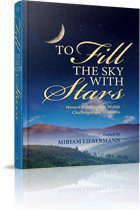To Fill The Sky With Stars: Women Explore Their Midlife Challenges and Triumphs
 To Fill The Sky With Stars: Women Explore Their Midlife Challenges and Triumphs
To Fill The Sky With Stars: Women Explore Their Midlife Challenges and Triumphs
Edited by Miriam Liebermann
Menucha Publishers
New York, 2014
490 pages
Reviewed by Yael Zoldan
“Then comes a new stage in life . . .” Miriam Liebermann writes poignantly in her new anthology, To Fill the Sky with Stars. The book, a sequel to The Best Is Yet to Be, is rife with essays, by familiar voices in the Jewish world as well as some newcomers, reflecting on the unique experiences of Jewish women in midlife. “Welcome to the empty nest,” Liebermann beckons, “where we face new circumstances, new pleasures and yes, new struggles.”
As I read through these essays, I am struck with the notion that though the specific challenges may differ in each stage of life, so much of what we struggle with remains the same. At every stage, we wonder: Who are we? What is our purpose? How do we sustain and improve our relationships? Are we primarily mothers? Wives? Daughters? What is our core self? How do we best use our talents to serve our Creator?In these pages, a diverse group of women discuss their changing roles and how they manifest in issues from the mundane to the sublime. One woman reflects on whether she is ready to pass the torch of hosting her family’s Purim seudah; another deals with reluctantly making aliyah to please her husband; yet another discusses the fear that comes along with experiencing a “senior moment.” In her essay, “True Beauty,” Denise Karasick speaks about women’s “deep-set ambivalence about aging” and concludes that a face that shows its age is “a masterpiece of art: the reflection of a life fully lived.” There are quite a few emotional pieces about moving on after the death of parents and sometimes spouses. One woman discusses her very unconventional midlife decision to initiate a “late in life adoption”; still others talk about career changes. Many of the contributors write movingly about the emptiness they feel as their children move on to have lives of their own.
At every stage, we wonder: “Who are we? What is our purpose? How do we sustain and improve our relationships?”
From a practical perspective, there are a number of tips on navigating these changing roles. Liebermann repeatedly stresses the importance of seeking out mentors, of surrounding oneself with friends, of exercising and maintaining good health. Libby Astaire offers a concise essay on the value of writing an ethical will. Miriam Hendeles describes penning her own “happiness mission statement.” In her essay entitled “Reinvention Conventions,” Rebbetzin Faigie Horowitz, a noted columnist and career counselor, addresses “women who are questing for purpose in midlife.” She says, “Midlife reinvention is much more like a road trip. . . and G-d may send you on some interesting detours. . . as you are forced to plot your course.”
There are essays on what it means to be done with the job of mothering and still others about how mothering never ends. There are thoughts on the value of maintaining relationships with other women, older and younger, as well as using newfound time to reinvest in one’s marriage. In response to criticism of Liebermann’s first book, there are also a number of writings that deal with the woman who does not have children or is not married. Prolific author and psychologist Dr. Miriam Adahan offers new perspectives on how these women can navigate their emotions and fill their midlife years with potential, engagement and fulfillment.
Some of the writers focus on maximizing their relationships with their grandchildren and still others on picking up new interests or resuming old ones that fell by the wayside, including creative outlets such as needlepointing, painting, dancing and writing.
Ultimately, this book speaks, practically and poignantly, to a large segment of the Jewish population and in that way fills an important niche. Flipping through its pages provides ample opportunity for laughter, tears, reflection and inspiration. The message of this book is most aptly described by a quote from Miriam Adler: “There can be so much joy in looking back and, with the help of HaKadosh Baruch Hu, in looking forward. The wisdom of women is boundless.”
Yael Zoldan is a freelance writer and author of four popular children’s books, including We Can Do Mitzvos from Aleph to Tav (New York, 2009) and Shimmy Shambone will NOT Take a Bath (New York, 2013). Her upcoming book, Shimmy Shambone Will NOT Go to Bed, is due in bookstores December, 2015.
